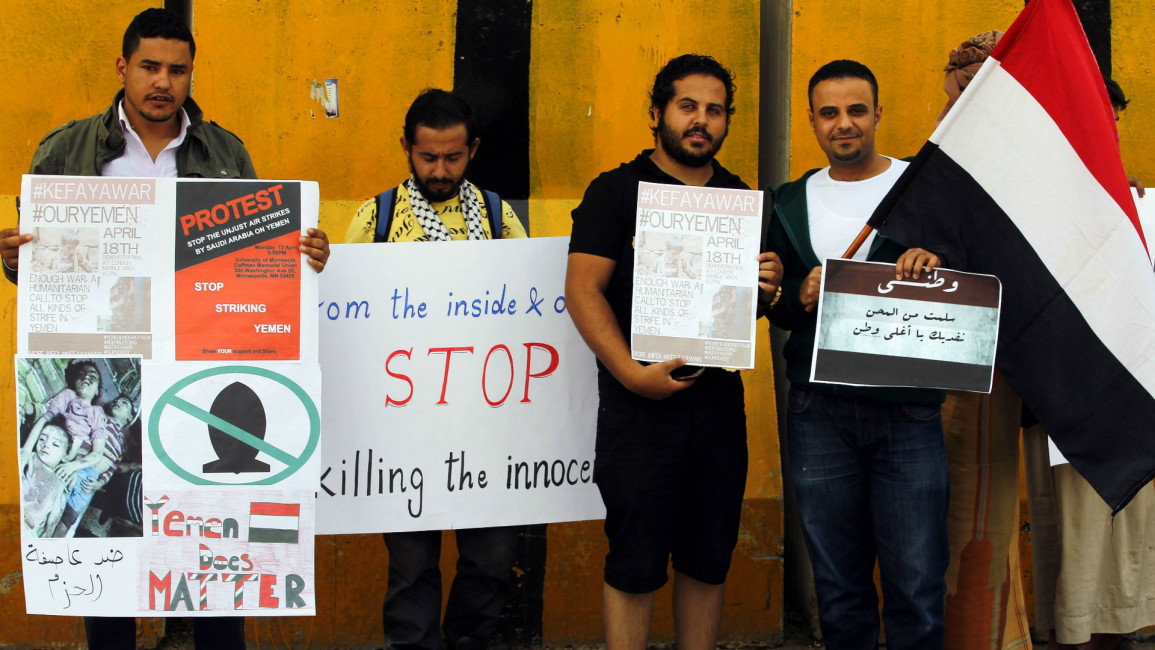Yemen's new vice president sworn in as airstrikes continue
Yemen's President Abed Rabbo Mansour Hadi, who fled the country in the face of the Houthi rebel advance last month, has appointed his former Prime Minister Khaled Bahah to be vice president in a move aimed at strengthening the beleaguered government, an official said.
"The president issued an order today appointing Khaled Bahah as his deputy," a presidential advisor told the Reuters news agency.
Bahah is popular across Yemen and may be seen as a figure who could calm tensions and bring warring parties to the negotiating table.
"The appointment of Bahah may help in finding a political solution as part of efforts to revive the dialogue process sponsored by the United Nations," the Hadi aide said.
A source from the Yemeni president's office told al-Araby al-Jadeed that the decision to appoint a vice president does not mean that the he will have any authority when it comes to military affairs because the decree does not state that he is deputy to the supreme commander of the armed forces.
The Gulf Cooperation Council welcomed Bahah's appointment as an important step towards helping Hadi's efforts to "restore security and stability in Yemen."
The bloc which groups Saudi Arabia with Bahrain, Kuwait, Oman, Qatar and the United Arab Emirates pledged to "continue to support all efforts" to push for a political solution in Yemen.
But there are no signs that the war will let up anytime soon.
Saudi Arabia and its Arab allies have been bombing Yemen for almost three weeks, hoping to slow the advance of Houthi militias toward the southern port city of Aden.
Saudi Arabia demanded on Sunday that Iran stop backing Shia rebels in Yemen but insisted it is "not at war with Iran."
Riyadh also dismissed Iranian calls to end air strikes and hit a military camp in Taiz on Sunday, killing eight civilians, according to a medical source.
The coalition said on Saturday that it has conducted 1,200 strikes since March 26 and neutralised the air and missile capabilities of the anti-government forces in the air war which is accompanied by a naval blockade.
Humanitarian fears grow
As the airstrikes and clashes continued between the warring facctions, aid agencies warned Monday of a growing humanitarian crisis including food shortages in Yemen.
Fighting was especially fierce in the main southern city of Aden, where medics and military forces said at least 30 people were killed in overnight clashes between rebels and supporters of President Hadi.
Residents said warplanes from a Saudi-led coalition of countries attack the rebel-held presidential complex and other positions in Aden, Hadi's last refuge before he fled to neighbouring Saudi Arabia as the air war began on March 26.
Heavy fighting in Aden overnight left at least 13 civilians, 11 rebels and six pro-Hadi fighters dead, medical and military sources said.
Humanitarian groups have struggled to bring aid into the country and said Monday the situation in Aden was deteriorating rapidly.
Earlier, the International Committee of the Red Cross said that it flew more than 35 tonnes of medical aid and equipment into Sanaa on Saturday, in addition to aid deliveries pn Friday organised by the Red Cross and UN.
Foreigners 'stranded'
Russia said its navy evacuated 308 people of various nationalities from Aden as the International Organization for Migration said more than 16,000 foreign nationals are stranded in Yemen.
The UN said at least 900 people had arrived in the Horn of Africa from in the past 10 days, most of them Somalis, but also Yemenis.
At a gathering in Doha, UN Secretary General Ban Ki-moon appealed for the resumption of Yemeni peace talks and for "a cessation of military moves as soon as possible".
Saudi Arabia heads a coalition of nine Arab countries which since 26 March 26 carried out air strikes against the Houthi rebels who overran Sanaa in September.
Saudi Foreign Minister Prince Saud al-Faisal urged Tehran not to assist the "criminal activities" of the Houthis "against the legitimate order of Yemen and (to) stop the delivery of weapons and aid" to the rebels.
But he insisted "we are not at war with Iran," which denies arming the rebels and whose supreme leader Ayatollah Ali Khamenei has described the coalition's involvement in Yemen as "criminal".
There was no immediate reaction from Tehran. But Iran's Deputy Foreign Minister Hossein Amir Abdollahian denied media reports that two members of his country's elite Revolutionary Guards had been captured in Yemen.
"Iran has no military forces in Yemen," he was reported as saying by the official IRNA news agency.
The rebels include forces who have remained loyal to ex-president Ali Abdullah Saleh after he was forced from power in 2012 following a year of nationwide protests against his three-decade rule.
The anti-government forces have been locked in battles against forces loyal to President Abedrabbo Mansour Hadi.
Al-Qaeda
Since the air campaign began, fighting has flared in 15 of Yemen's 22 provinces.
The Houthis have won support from renegade soldiers loyal to ex-president Saleh, but on Sunday soldiers from two brigades in Marib joined the ranks of the pro-Hadi fighters, a tribal chief said.
In Shabwa, tribesmen seized the base and arms of a rebel brigade, before clashing with other renegade troops and forcing them to surrender their weapons.
Al-Qaeda mlitants have taken advantage of the insecurity to seize Mukalla, the capital of Hadramawt province.
A suspected US drone late Saturday hit an alleged Al-Qaeda vehicle in Mukalla, killing six 'suspected militants', the government said.
US Defence Secretary Ashton Carter acknowledged last week that al-Qaeda was making gains and the fighting in Yemen was complicating counter-terrorism efforts but vowed they would go on.



